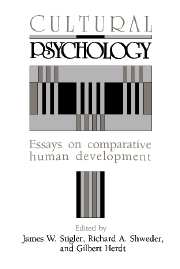Book contents
- Frontmatter
- Contents
- Preface
- Cultural psychology – what is it?
- Part I The keynote address
- Part II Cultural cognition
- Part III Cultural learning
- Part IV Cultural selves
- 10 Adolescent rituals and identity conflicts
- 11 Sambia nosebleeding rites and male proximity to women
- 12 On self characterization
- Part V Cultural conceptions of psychoanalysis
- Part VI Cultural domination and dominions
- Part VII A skeptical reflection
- List of conference participants
- Name index
- Subject index
12 - On self characterization
Published online by Cambridge University Press: 05 June 2012
- Frontmatter
- Contents
- Preface
- Cultural psychology – what is it?
- Part I The keynote address
- Part II Cultural cognition
- Part III Cultural learning
- Part IV Cultural selves
- 10 Adolescent rituals and identity conflicts
- 11 Sambia nosebleeding rites and male proximity to women
- 12 On self characterization
- Part V Cultural conceptions of psychoanalysis
- Part VI Cultural domination and dominions
- Part VII A skeptical reflection
- List of conference participants
- Name index
- Subject index
Summary
The finished man among his enemies? –
How in the name of Heaven can he escape
That defiling and disfigured shape
The mirror of malicious eyes
Casts upon his eyes until at last
He thinks that shape must be his shape?
And what's the good of an escape
If honour find him in the wintry blast?
Yeats, “A Dialogue of Self and Soul”
In this chapter I develop several ideas about the self, the other, and their characterizations that have received preliminary formulation in some of my previous publications, particularly those on life history (1977, 1980), transference and countertransference (1981), dialogue (n.d.), and the relationship between self and desire (1982). In these papers I adopted a radically dialectical approach to the self. I argued that self-awareness arises when the ego – my most primitive prereflexive term – views himself, herself, or more accurately (since gender attributions require minimal self-reflection) itself (understood in a pregender way) from the vantage point of the other. Unlike Hegel ([1807) 1977), George Herbert Mead (1964), and Jean-Paul Sartre ([1943] 1956, [1952] 1964), however, I maintained that the dialectical movement is continuous; that the characterizations, or the typifications, of the other are subject to (a) conventional constraints embedded in language (understood broadly, as in the German Sprache), (b) desire (itself articulated through and constrained by language), and (c) the resistance of the other, resistance being understood in phenomenological terms as the most elementary criterion of the real.
- Type
- Chapter
- Information
- Cultural PsychologyEssays on Comparative Human Development, pp. 401 - 424Publisher: Cambridge University PressPrint publication year: 1990
- 24
- Cited by



